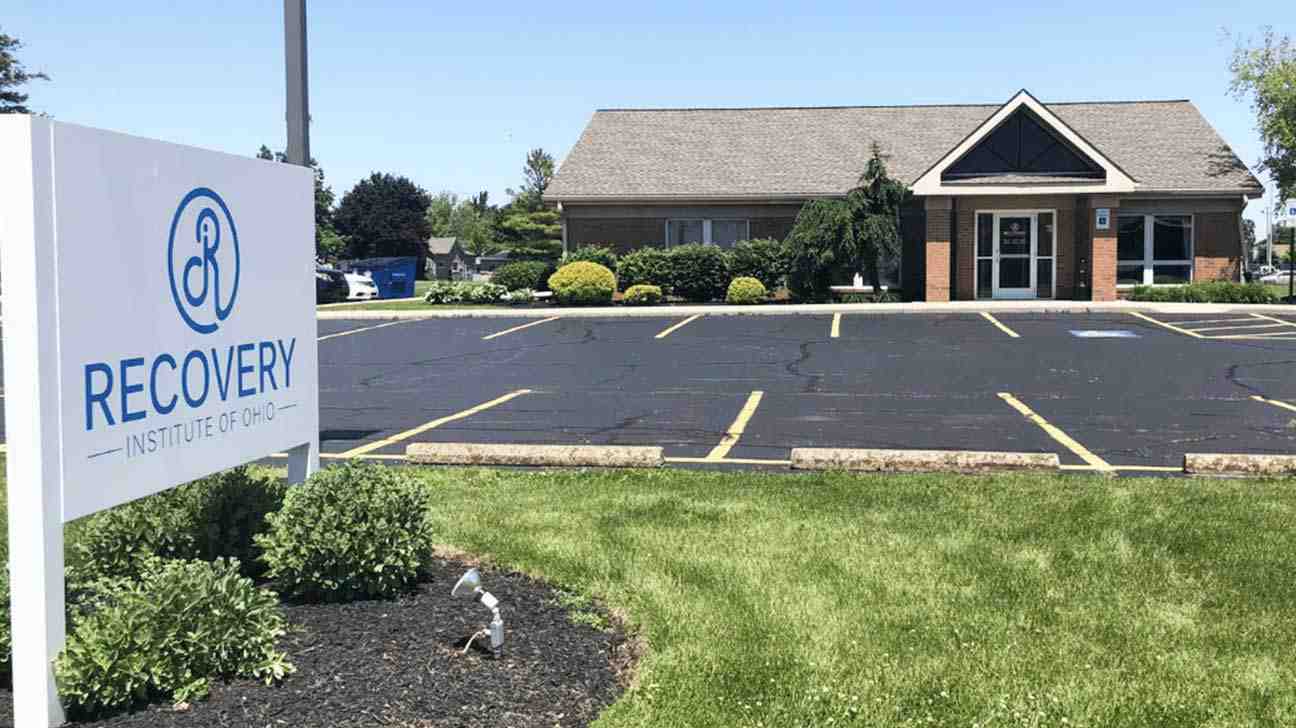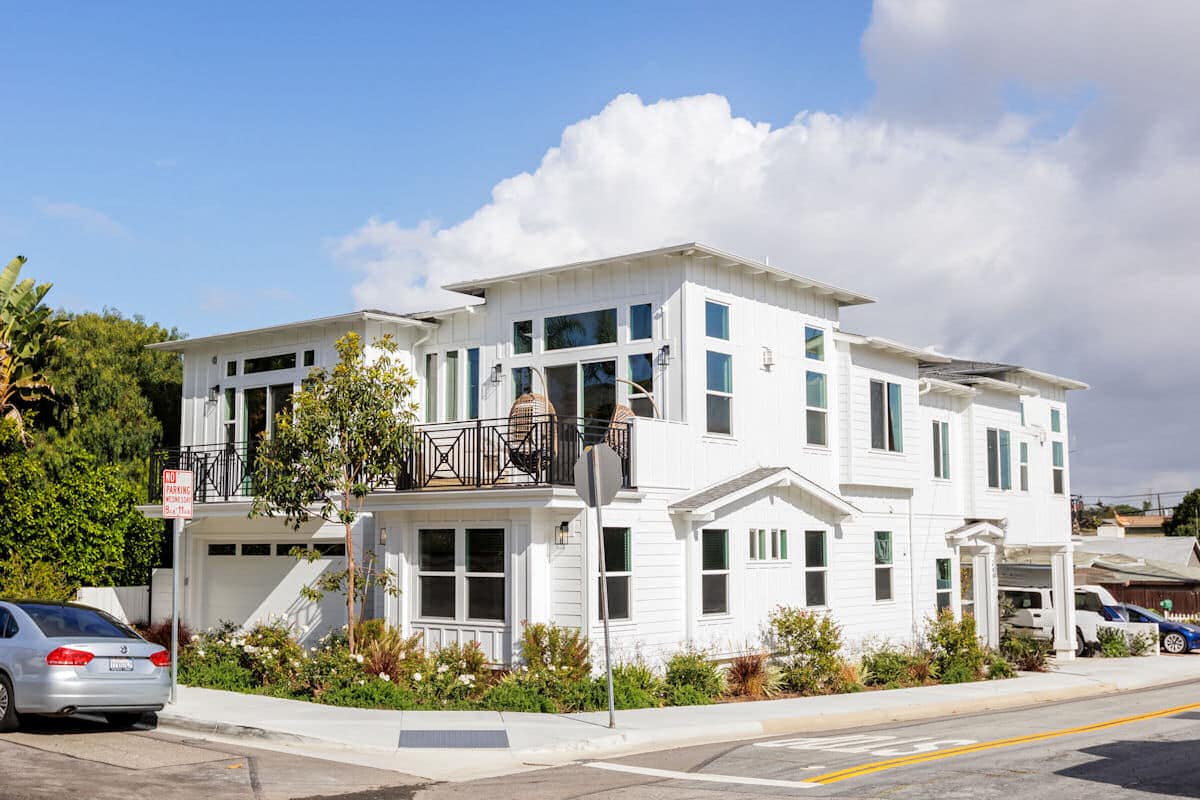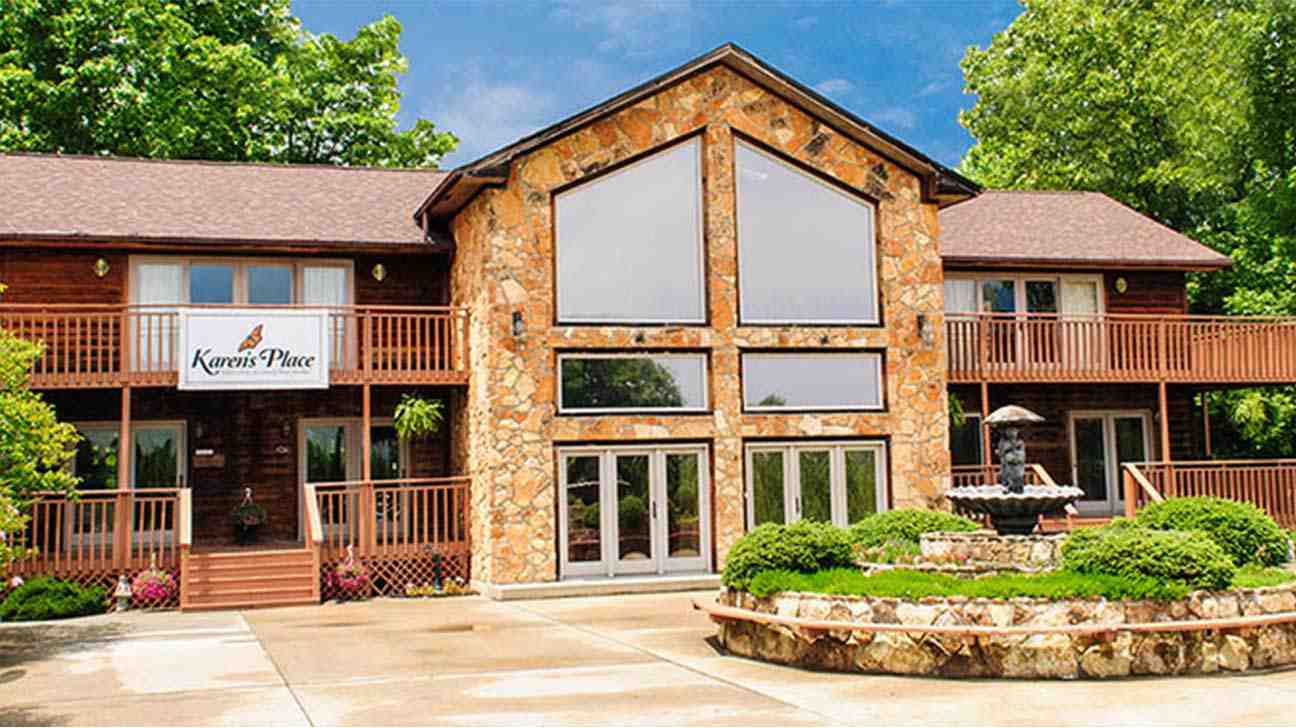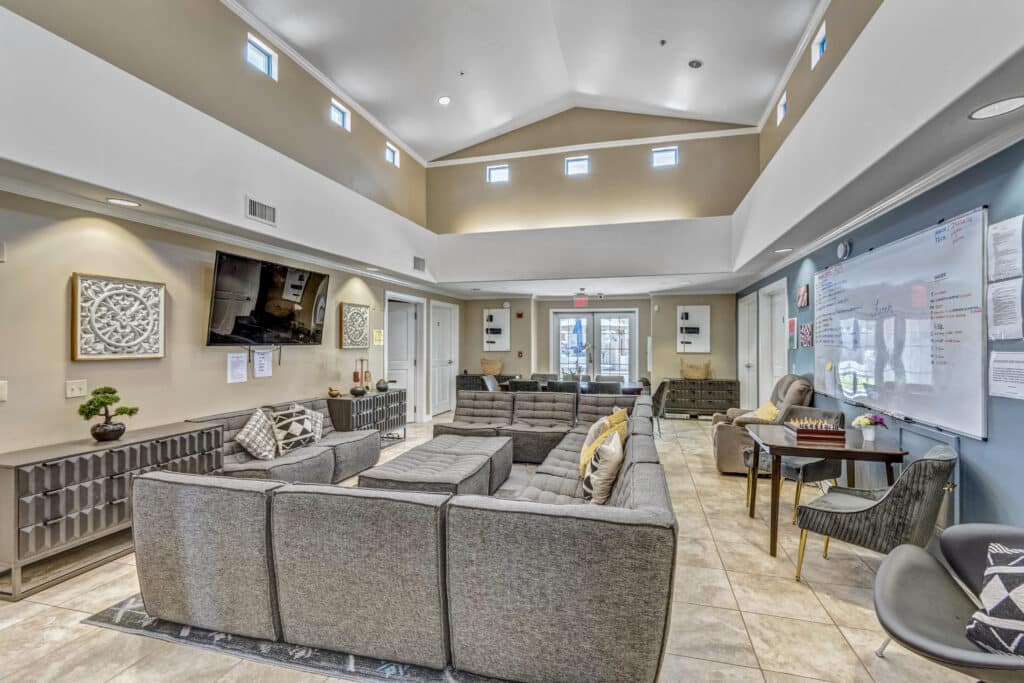
Why Residential Rehab for Depression Matters
Residential rehab for depression is a live-in treatment program that provides 24/7 care, intensive therapy, and a structured environment for individuals struggling with severe or treatment-resistant depression. If you’re wondering whether this level of care is right for you or a loved one, here’s what you need to know:
When to Consider Residential Treatment:
- Outpatient therapy and medication haven’t provided relief
- You’re experiencing thoughts of self-harm or suicide
- Depression is affecting every aspect of daily life
- Co-occurring substance use is present
- You need a safe space away from daily stressors
What Residential Treatment Offers:
- Round-the-clock medical and psychiatric support
- Evidence-based therapies like CBT and DBT
- Peer community and group therapy
- Medication management
- Safe, structured healing environment
- Personalized aftercare planning
Depression is the leading cause of disability worldwide, affecting more than 300 million people. For many, traditional outpatient care isn’t enough. When someone describes feeling “profound sadness that doesn’t fade away at the end of the day,” or when depression co-occurs with substance use, a more intensive approach becomes necessary.
The reality is stark: Most residential treatment centers focus primarily on substance abuse, and very few specialize in anxiety and depression. This makes finding the right program challenging but not impossible.
At Addiction Helpline America, we’ve spent years connecting individuals and families to the right treatment resources for depression and co-occurring disorders. Our team understands the unique needs of those seeking residential rehab for depression and provides confidential guidance to help you steer your options.
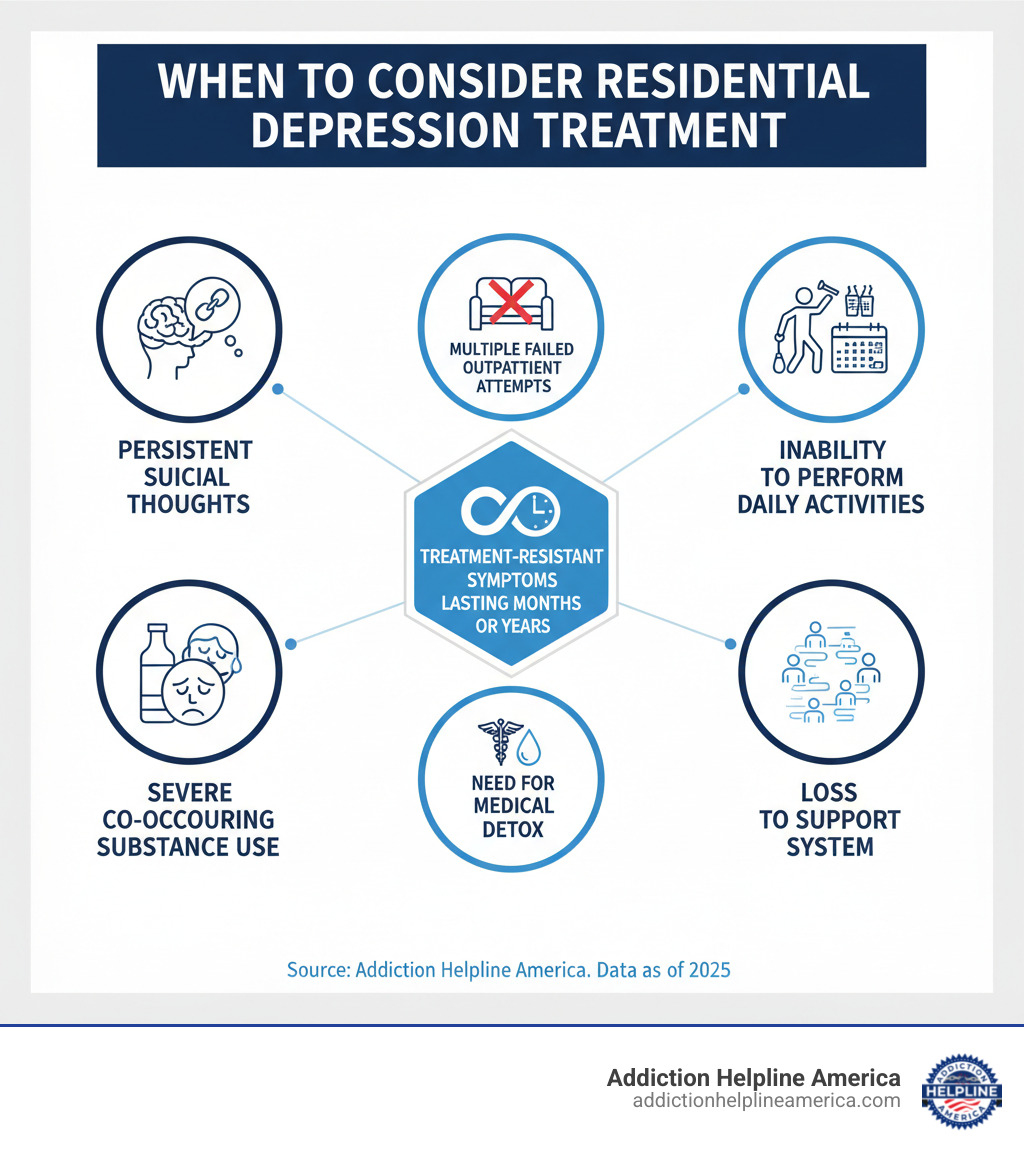
Residential rehab for depression glossary:
Understanding Residential Treatment for Depression
When someone is struggling with severe depression, the words “residential treatment” can feel both hopeful and overwhelming. Let’s break down exactly what a residential rehab for depression means and how it differs from other types of care.
A residential treatment center (RTC) is a live-in healthcare facility providing 24/7 comprehensive therapy and support for mental health conditions, substance use, or both. It’s a healing sanctuary where you can step away from daily stressors and focus entirely on getting better. This immersive, structured environment removes you from triggers and obligations, and for many, this shift becomes the turning point in their recovery.
How does residential treatment compare to other options? It’s helpful to understand the spectrum of mental health care:
Residential or Inpatient Care: This is the highest level of care, involving living onsite for structured treatment with 24/7 medical and clinical supervision. It’s ideal for severe depression, co-occurring substance use, or when other treatments have failed.
Partial Hospitalization Programs (PHP): A step-down from residential, PHPs provide 20 or more hours of treatment weekly. You return home or to sober living at night. It’s suitable for serious conditions that don’t require constant supervision.
Intensive Outpatient Programs (IOP): More flexible, IOPs offer 9 to 20 hours of weekly treatment while you live at home. It provides more support than traditional outpatient care while allowing you to maintain some daily responsibilities.
Traditional Outpatient Care: The most flexible option, this involves regular therapy sessions while living at home. It works well for less severe conditions or as a step-down after completing a more intensive program.
For a deeper understanding of these differences, we’ve created a comprehensive guide on Inpatient vs. Outpatient Rehab.
It’s important to know that while many RTCs focus on substance abuse, excellent programs exist that are equipped to treat depression, especially when it co-occurs with substance use (a “dual diagnosis”). Since these conditions often fuel each other, an integrated approach that treats both simultaneously is crucial for effective, lasting recovery.
When to Consider Residential Treatment
Recognizing the need for a higher level of care is a sign of strength. Residential treatment may be the right choice if you’re experiencing:
- Severe, persistent symptoms: Debilitating sadness, loss of interest, and fatigue that haven’t improved with outpatient care or medication.
- Safety concerns: Thoughts of self-harm or suicide that require a 24/7 supervised setting.
- Inability to function: Depression makes daily tasks like hygiene, eating, or getting out of bed feel impossible.
- An overwhelming environment: Daily stressors, triggers, or a difficult home life make recovery in your current setting feel impossible.
- Co-occurring substance use: Using drugs or alcohol to cope with depression requires integrated, dual diagnosis treatment.
For a complete overview of when inpatient mental health care becomes necessary, explore our complete guide to Inpatient Mental Health.
Key Benefits of a Residential Rehab for Depression
This level of care can be genuinely transformative for several reasons:
- Immersive Therapeutic Environment: With no daily distractions, your only job is to heal.
- 24/7 Medical and Clinical Support: A constant safety net is available for crises, medication needs, or emotional support at any hour.
- Peer Community: Group therapy and communal living connect you with others who understand your struggle, reducing isolation.
- Intensive Skill-Building: You’ll learn and practice healthy coping mechanisms daily in a supportive setting.
- Distance from Triggers: Stepping away from work, family, and environmental stressors allows for deeper, uninterrupted therapeutic work.
- Safety and Structure: A predictable routine provides stability when your internal world feels chaotic, creating a solid foundation for recovery.
If you or a loved one is in crisis and needs immediate help, resources are available right now. Learn more about Crisis Intervention Services and how to access support quickly.
What to Expect in a Residential Rehab for Depression

Walking into a residential rehab for depression for the first time can feel overwhelming. We’ve guided countless individuals through this journey, and we want you to know what to expect.
Expect a structured daily schedule with a predictable rhythm of therapy, meals, and activities. This routine provides stability and includes individual and group therapy, educational workshops, and personal time. Upon arrival, you’ll work with a clinical team to create an individualized treatment plan custom to your unique symptoms, history, and goals.
You’ll become part of a therapeutic community, living and healing alongside peers and staff. This shared experience fosters connection, reduces isolation, and provides a safe space to practice new social skills. Client safety is paramount, ensured through 24/7 supervision, clear guidelines, and crisis intervention protocols, which is especially crucial if you’re experiencing thoughts of self-harm.
Treatment goals are comprehensive, focusing on long-term symptom management, developing effective coping skills, medication adherence, improving daily functioning, building a support network, and addressing any co-occurring disorders or trauma.
Core Therapeutic Approaches
The therapies offered in a residential rehab for depression are evidence-based approaches with proven effectiveness.
- Dialectical Behavior Therapy (DBT): Highly effective for severe emotional pain and self-harming behaviors, DBT teaches four key skills: mindfulness, distress tolerance, emotion regulation, and interpersonal effectiveness.
- Cognitive Behavioral Therapy (CBT): CBT helps you identify and challenge the negative thought patterns that fuel depression. By replacing distorted thoughts with more balanced ones, you can change how you feel and behave.
- Group Therapy: In daily group sessions, you’ll share experiences, practice new skills, and receive support from peers and a facilitator. These connections are a powerful reminder that you are not alone.
- Individual Therapy: Regular one-on-one sessions with your dedicated therapist provide a private space to explore personal issues, process trauma, and work on challenges specific to your depression.
- Family Therapy: This helps repair relationships and educate loved ones on how to support your recovery. These sessions improve communication and build a strong support system for your return home. Learn more about our approach to Family Therapy in Addiction Recovery.
Addressing Co-Occurring Disorders
Depression often co-occurs with anxiety, PTSD, or substance use disorders (a dual diagnosis). Integrated dual diagnosis treatment addresses all conditions simultaneously, which is more effective as they often fuel each other. Understanding the link between depression and substance abuse is essential to breaking this cycle.
If needed, medical detox is the first step. Under 24/7 medical supervision, you’ll safely withdraw from substances in a comfortable environment. After detox, specialized therapies will address how your conditions interact, helping you develop coping strategies for both. The peer community provides support from others facing similar challenges.
Medication and Alternative Therapies
For many, medication is an important part of treatment. The residential setting is ideal for medication management, as a psychiatrist can prescribe and closely monitor your response to antidepressants, allowing for quick adjustments. Nursing staff are available 24/7 to address concerns. Medication works best when combined with therapy and lifestyle changes.
Many programs also offer holistic therapies to support your core treatment by nurturing your mind, body, and spirit.
- Yoga and mindfulness practices help calm the nervous system and develop present-moment awareness.
- Art therapy provides a non-verbal outlet to process complex emotions and gain self-awareness.
- Equine therapy, through interaction with horses, teaches lessons in communication, trust, and emotional regulation.
Other complementary methods like music therapy, acupuncture, or meditation can add another dimension to your healing journey. For more information, explore our page on Holistic Drug Rehab.
Navigating the Logistics: Cost and Admissions

We know that deciding to pursue a residential rehab for depression is just the first step. Understanding the practical details—cost, payment, and admissions—can feel overwhelming. Let’s walk through it together.
The journey starts with a comprehensive initial assessment. This conversation helps the clinical team determine if their program is a good fit and allows you to begin verifying insurance coverage. The Affordable Care Act considers mental health treatment an essential benefit, so most insurance plans provide coverage. Many facilities work with PPO plans, and our team at Addiction Helpline America specializes in verifying your benefits to help you understand costs and maximize coverage.
If you lack sufficient insurance, private pay options are available. Some facilities offer payment plans or work with healthcare financing companies to make treatment more manageable.
If you’re employed, you may be eligible for up to 12 weeks of job-protected leave under the Family and Medical Leave Act (FMLA). This allows you to seek treatment for a serious health condition without risking your job. Speak with your HR department about eligibility or visit the Department of Labor’s FMLA FAQ page.
For a complete picture of what residential treatment might cost, we’ve put together A Guide to Rehab Center Costs.
Finding the Right Residential Rehab for Depression
Which facility is right for you? This decision deserves careful thought. We’re here to help you identify what matters most.
- Accreditations: Look for accreditations from The Joint Commission or CARF, which indicate the facility meets high standards for patient care and safety.
- Staff Qualifications: Inquire about the credentials and experience of the clinical team. You want experts in treating depression who are also compassionate.
- Treatment Philosophy: Find a philosophy that resonates with you. Some centers focus on evidence-based therapies like CBT/DBT, while others integrate holistic approaches.
- Location and Amenities: The physical environment matters. Consider if you prefer a rural or urban setting, private or shared rooms, and what amenities would support your healing.
- Aftercare Support: A quality program will have a clear aftercare plan, including referrals, step-down programs (PHP/IOP), and alumni networks to support your long-term recovery.
- Specialized Programs: Look for specialized programs if you have co-occurring disorders, trauma, or other specific needs. Custom treatment is most effective.
Finding the right program doesn’t have to be a solo mission. Our guide on How to Find a Rehab Center Near Me offers additional strategies. And our team at Addiction Helpline America is ready to provide personalized guidance. We’ll help you connect with a residential rehab for depression that aligns with your path to recovery. You don’t have to figure this out alone.
Life After Rehab: Ensuring Lasting Recovery
Completing a program at a residential rehab for depression is a monumental achievement. But leaving residential care doesn’t mean your recovery journey is over. The period immediately following discharge is critical, which is why thoughtful aftercare planning is so important.
Aftercare (or continuing care) is the ongoing support you receive after treatment. It acts as a bridge back to everyday life, helping you reinforce skills, manage challenges, and prevent relapse. The discharge process starts long before you leave, as your clinical team collaborates with you and your family to create a personalized continuing care plan custom to your specific needs.
Your aftercare plan might include:
- Step-Down Programs: A Partial Hospitalization Program (PHP) or an Intensive Outpatient Program (IOP) can bridge the gap between 24/7 care and full independence, allowing you to practice new skills with a safety net. For a detailed look, explore our Complete Guide to Intensive Outpatient Programs.
- Continuing Therapy: Ongoing individual and group therapy helps you maintain momentum. Mutual support groups offer a community of people who understand your journey.
- Medication Management: Continued psychiatric follow-ups are essential to ensure your medication remains effective.
- Recovery Support: Some programs offer recovery monitoring or life coaching to help you steer re-entry into daily life.
The goal is to help you maintain the gains you’ve made and continue building the life you want—one day at a time.
The Role of Family and Support Systems

Recovery from depression is rarely a solitary journey. Your support network can significantly improve the effectiveness of your treatment. Many residential rehab for depression programs encourage family participation, offering dedicated programs and therapy sessions. This helps loved ones understand depression, learn to support you, and improve family dynamics. Learn more about our approach to Family Therapy in Addiction Recovery.
Educating families about depression helps them become a more effective source of support. Often, the most helpful thing a loved one can do is listen without judgment. Beyond family, building a broader support network of friends, mentors, and peers from alumni programs is also vital. These connections provide ongoing encouragement and shared experience.
Your aftercare plan should include guidance on finding a qualified therapist for continued professional support, which is key to maintaining your progress. Asking for help and accepting support isn’t a sign of weakness—it’s a sign of strength and wisdom. Building these relationships is an investment in your long-term recovery.
Conclusion
If you’ve made it this far, you’ve taken an important step—learning about residential rehab for depression and understanding how it can offer real hope for recovery. We’ve walked through what these programs provide: the immersive therapeutic environments, the round-the-clock medical and clinical support, the evidence-based therapies like DBT and CBT, and the peer community that reminds you that you’re not facing this alone. We’ve explored how these facilities address co-occurring disorders, integrate medication management with holistic therapies, and create personalized treatment plans designed specifically for your needs.
The path through severe depression can feel impossibly dark, but residential rehab for depression offers a structured, safe space where healing can truly begin. It’s where you can step away from daily stressors, develop essential coping skills, and focus entirely on your recovery. The benefits extend beyond your stay—with comprehensive aftercare planning, step-down programs, and ongoing support systems, you’re equipped to maintain the progress you’ve made and continue building a life worth living.
We understand that navigating the logistics—from insurance coverage to finding the right facility—can feel overwhelming. That’s exactly why Addiction Helpline America exists. We’re here to provide confidential guidance and personalized program matching, connecting you with a treatment center that truly fits your unique situation. Whether you’re dealing with treatment-resistant depression, co-occurring substance use, or simply need a more intensive level of care, we can help you find the right path forward.
You deserve support. You deserve healing. And you absolutely deserve hope. Recovery from depression is possible, and residential treatment has helped countless individuals reclaim their lives. Take that courageous step—reach out today.
Explore different types of treatment programs to learn more about your options, or contact us directly for personalized guidance. Your journey toward lasting recovery can start right now.
Our helpline is 100%
free & confidential
If you or someone you care about is struggling with drug or alcohol addiction, we can help you explore your recovery options. Don’t face this challenge alone—seek support from us.
Programs
Resources
Will my insurance
cover addiction
treatment?
We're ready to help
Find the best
drug or alcohol treatment
center
Are you or a loved one struggling with addiction? Call today to speak to a treatment expert.





